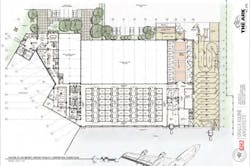A brand new, $48 million cargo hangar project is underway at John F. Kennedy Airport’s long-empty building 78. The ARK at JFK is the first privately owned, full-service animal terminal in the United States.
The ARK, a subsidiary of private equity firm Racebrook Capital, will serve as a hub for all animal cargo, quarantine and transportation needs going in and out of JFK. A number of different animal service providers are already signed as tenants for cargo, boarding and veterinary services, says The ARK’s managing director, Dr. Aaron Perl.
“They are spending hundreds of millions of dollars over the next few years to completely upgrade the cargo infrastructure,” Perl says. “One of those pieces is the import and export of animals through JFK which will happen exclusively through The Ark at JFK.”
ARK Development, LLC, The ARK’s development company, signed a 30 year lease to develop the then-vacant Cargo Building 78 at JFK in January. The lease came with a budget bump to $48 million and estimations of 180 new jobs and $108 million in revenue over the life of the lease.
The ARK represents a new option for animal carriers coming through New York City. Animal handlers are currently using the outdated Vetport facility, built in the 1950s, to handle veterinary and boarding services during animal stops. Perl says that JFK has been looking to replace the Vetport facility for the past 10 years.
Loading Them Two-By-Two
The ARK’s main cargo tenant and exclusive animal cargo handler, Consolidated Aviation Services (CAS) comes with a long-established animal cargo history.
“They have a great deal of experience in addition to being North America’s leading cargo handler,” Perl says. “They’ve also handled most of the animals coming in and out of JFK for the last few years.”
CAS does, in fact, already handle approximately 80 percent of the horses that come through JFK, according to Phil Jensen, director of sales and marketing at CAS.
“We also operate in five large cargo buildings here,” Jensen says. “We have a lot of resources, a lot of staff and a lot of experience. We handle 44 airlines at JFK.”
For CAS, shipping and handling “even small animals” is “big business,” according to Jensen. CAS’s specialty includes working within the animal care programs in place with many airlines so that travelers can bring their pets with them.
CAS is signed on to handle 50 percent of all cargo for building 78, home of The ARK. That means that general cargo will also be unloaded there alongside animal cargo. CAS, as the main cargo tenant at The ARK, will service airlines picking up and dropping off animals at The ARK. AirFrance-KLM (AFKLM), one of the world’s foremost airlines for those shipping animals, currently handles live animals at JFK in building 261 and is signed on with CAS as The ARK’s main airline tenant.
Jeff Metzelaar, AFKLM’s manager of cargo for variation products including live animals, says that the current setup at JFK is being done under strenuous conditions, especially when Northeastern weather rages to the extremes in both summer and winter.
“JFK being the biggest import and export station for horses faces the disadvantages of a long acceptance process and long transportation from the warehouse to the restricted Airport Operating Area,” Metzelaar says.
The advantage of The ARK, according to Metzelaar, is that all animal handling will be done inside the warehouse and more than makes up for the longer transport time from building 78 to JFK’s terminal 4.
“The ARK will have all activities for live animals done indoors with no negative influence of any weather condition,” Metzelaar says. “On top of it, the handling in general will be done in a more effective way resulting in a short throughput time in general. The fact that any animal will have a more suitable environment, not only for handling, but also climate-wise, makes The ARK one of the best live animal locations in the country.”
Metzelaar says that The ARK will be able to hold between 40 and 50 horses for the required five hour rest period between travel intervals.
“We have the world leading carrier of animals,” Perl says. “With North America’s leading cargo handler moving into our building as our anchor tenant.”
Sailing in First Class
The ARK’s creature comforts are planned to be second to none. The hangar is slated to house a veterinary facility for any necessary service, but will focus on pre-travel screening. The veterinary services are provided by East End Veterinary, a New York-area animal hospital, with assistance from the Cornell University College of Veterinary Medicine and has been designed using specifications directly from the USDA. Having veterinary services available on-site means cargo handlers don’t need to worry about sources for pre-travel screenings.
Most of the buzz surrounding The ARK has, to this point, revolved around the luxurious boarding facilities that will be available for cats and dogs at staying at Paradise 4 Paws, The ARK’s boarding tenant. Other Paradise 4 Paws locations in Chicago and Denver offer bone-shaped swimming pools, play areas for both large and small dogs, training, grooming and even massage therapy. Cats staying at Paradise 4 Paws won’t exactly be slumming it either.
“The cats will have their own wing with bungalows and the Cat Adventure Jungle where they can romp around the climbing trees and stalk the fish in the aquarium,” Johanna Newcomb, chief barketing officer (not a typo) at Paradise 4 Paws says. “Aside from some layout differences due to building differences, our resort for the ARK at JFK will be very similar to our other resorts.”
The use of tenants, as opposed to operating each aspect of The ARK themselves, is a key to the project’s success, according to Perl. “We’re here to play with everyone else,” Perl says. “We are not going to put other people out of business.”
The ARK itself serves as a coordinator of services more than as a service provider. Perl calls The ARK a “turnkey” solution for all animal cargo services required by the shipping and cargo industry and says that, finally, all of those services will be under one rather large roof.
“The shippers will continue to be the main point of contact for the owners of horses and livestock,” Perl says. “They will handle all of the processes, they will interact with the airlines, with the cargo handlers, and The ARK.”
Filling The ARK
Perl compares The ARK’s potential to that of Lufthansa’s Animal Lounge in Frankfurt, a state of the art European facility that serves as the standard for worldwide animal shipping.
“If you take Frankfurt for example, they see 14,000 dogs and cats a year,” Perl says. “We believe JFK should be able to handle that capacity.”
Federal regulations require that horses rest for five hours between travels. Imported horses also must be quarantined to check for infectious disease when they arrive in the United States. In New York, that meant trucking horses over 80 miles to the nearest quarantine facility in Newburgh, NY.
The boarding facilities at The ARK meet all of the requirements necessary to reduce extra travel and stress for both animals and cargo handlers alike.
“Let’s say the horse is trucked here from Chicago,” Jensen says from his New York office. Before being loaded onto the plane, Jensen says, the horse has to rest for five hours, minimum. “He has to go into a care center or into a stall and be rested before he’s flown to the next destination.”
It’s that extra care that separates animal cargo from shipping goods. Obviously, making sure your animals arrive safely isn’t as easy as slapping a “fragile” sticker on the side.
“As a professional pet shipper, it is essential that I have access to an on-site veterinarian for a pet with any medical emergencies while in transit,” says Sally Smith, owner of Airborne Animals and past president of the International Pet and Animal Transportation Association. “There are other facilities across the globe, but ARK will bring these luxury accommodations to John F. Kennedy International Airport, one of the country’s major hubs and replace the very old, current facility.”
Perl’s excitement about The ARK is palpable and contagious. To be fair, the prospect of these once-disparate services being offered in one place is exciting. Still, Perl says there’s a lot of cooperation that needs to be followed through on to achieve success, but that “partners and tenants are waiting in line” to hold their spot in The ARK.
“If we wish for anything, it’s to see this building become functional and operational,” Perl says. “And for this model to change the face of the cargo industry and the animal transport industry in particular.”
By The Numbers: Frankfurt Animal Lounge
The ARK at JFK’s staff haven’t publicized exact capacity and volume expectations, but The ARK’s executive director, Dr. Aaron Perl, compares The ARK’s capabilities to that of Europe’s leading animal travel hub, Lufthansa’s Animal Lounge in Frankfurt. Here is the Frankfurt Animal Lounge’s annual animal volume, by the numbers:
- 2,000 horses
- 14,000 dogs and cats
- 80 million ornamental fish
- 8,000 pigs
- 150 zoo animals
Source: http://www.lufthansagroup.com/en/themen/animal-lounge.html
Image credits: Lufthansa Cargo AG
(Use the horse photo in here)
Pullquotes:
The ARK represents a new option for animal carriers coming through New York City, animal handlers are currently using the outdated Vetport facility that was built in the 1950s.
“The ARK will have all activities for live animals done indoors with no negative influence of any weather condition,” Metzelaar says.
“We have the world leading carrier of animals,” Perl says. “With North America’s leading cargo handler moving into our building as our anchor tenant.”
“The shippers will continue to be the main point of contact for the owners of horses and livestock,” Perl says.
“If you take Frankfurt for example, they see 14,000 dogs and cats a year,” Perl says. “We believe JFK should be able to handle that capacity.”
Making sure your animals arrive safely isn’t as easy as slapping a “fragile” sticker on the side.

